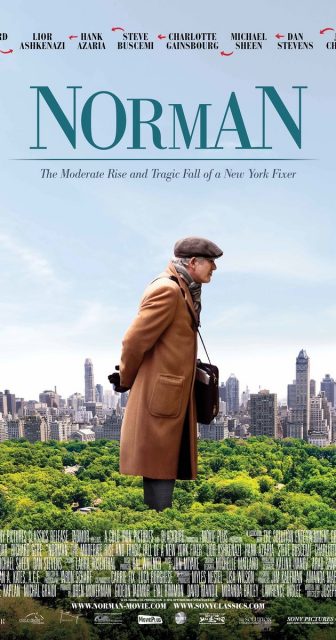Within the first few seconds of “Norman: The Moderate Rise and Tragic Fall of a New York Fixer,” we hear the names of two Jewish families – the Wilfs and the Taubs.
I cringed.
Because the Wilfs and the Taubs are real people –Jews who have been generous to a vast variety of causes, and whose good works I admire.
I can only hope that those families gave the producers permission to use their names, and to create characters that are loosely (very loosely) based on them.
That was the first time that I cringed during “Norman.”
It was not to be the last.
“Norman” is the latest movie by Israeli director Joseph Cedar
You might recall Cedar’s last film — the enchanting “Footnote.” It was a great film — nominated for Best Foreign Picture. It explored an unusual topic – the world of Israeli Talmudic scholarship.
“Norman” stars Richard Gere (sporting an admirable outer borough New York accent) as Norman Oppenheimer, a New York dealmaker.
Norman trades in relationships, pseudo-relationships, and favors. He befriends a rising Israeli politician, Micha Eshel (Lior Ashkenazi). He treats Eshel to an over-expensive pair of shoes, and attempts to capitalize on the relationship when Eshel becomes Prime Minister of Israel.
From there, Norman’s story descends into an amusing, painful, embarrassing, and ultimately tragic series of encounters.
Norman is a collection of classic Jewish archetypes – a macher (a person who gets things done), a schnorrer (a beggar), and even sometimes, despite himself, a mensch.
But, more often, he is a name dropper, a business card distributor, and a people collector.
His life is a viral contagion of favors, in which he owes people, people owe him, and people owe each other because they owe Norman.
He over-promises and under-delivers – especially to his struggling synagogue, and its rabbi, played by Steve Buscemi, in an un-weird, sympathetic performance.
And so, is “Norman” good for the Jews?
Let’s just say this.
“Norman: The Moderate Rise and Tragic Fall of a New York Fixer” would have killed my grandmother.
And yours, too, come to think of it.
Just like Shylock in “The Merchant of Venice.”
Just like Fagin in “Oliver Twist.”
Just like how the American Jewish establishment called Philip Roth on the carpet in 1959 over “Goodbye Columbus”
Oh, let’s face it. Richard Gere might have said on NPR that “every culture has a Norman.”
But, Normanism is uniquely Jewish. It is part of our spiritual and historical DNA.
- We first met him as Mordecai, Esther’s uncle, who implores her to plead for the safety of her people in ancient Persia.
- We met him as the shtadlan, the Jewish intercessor in the courts of medieval and early kings. The shtadlan had one item on his job description: to curry favor with the monarch in order to win benefits for a powerless Jewish population.
- We meet Norman at every major Jewish conference and convention. He hangs out on the fringes, and sometimes on the inside, of every Jewish organization. In fact, the film features a knowing facsimile of an AIPAC policy convention.
He (and yes, she) is always snuggling up to the powerful or almost-powerful, always ready to make the next appointment, always ready for the ubiquitous “ask.”
And, yes, “Normanism” is alive and well – even and especially within the rarified inner precincts of the White House.
We might not like it. But, contemporary Jewish life could barely function without its “Normans.”
More than this: if we declare that Jewish foibles are off limits, then we are saying to ourselves that Jews are powerless, and that we are always gearing up for the next pogrom – or alt-right inspired tweets.
We would be saying that Jews are hot house flowers, too delicate to be part of the larger conversation.
That Jews are, well, “snowflakes.”
It reminds me of a conversation that I had with an Italian-American friend. It was during the heyday of the HBO series, The Sopranos, which, arguably, was not the most flattering portrait of his landsmen.
He told me: yes, he was offended by this weekly assault on his ethnic heritage. (Ask yourselves: would Jews have stood for this?)
But ultimately, he said, the exposure of a group’s uncomfortable side is part of the price for living in a pluralistic culture.
Oh, by the way: if you didn’t like “Norman,” get ready for Robert DeNiro’s upcoming performance as Ponzi schemer, Bernie Madoff, in “Madoff: Wizard of Lies,” appearing soon on HBO.
Madoff did real damage to many American Jews, and others. Madoff’s thievery inflicted deep wounds to many American Jewish organizations – and to the American Jewish self-image itself.
Jews have survived many things, too numerous to list.
We will survive “Norman.”
And we will survive “Madoff.”
The only real challenge is: How do we create Jews who will look neither to expediency nor deception as the bedrock of their relationships?
I – along with every other rabbi, Jewish educator, and parent – am working on it.






